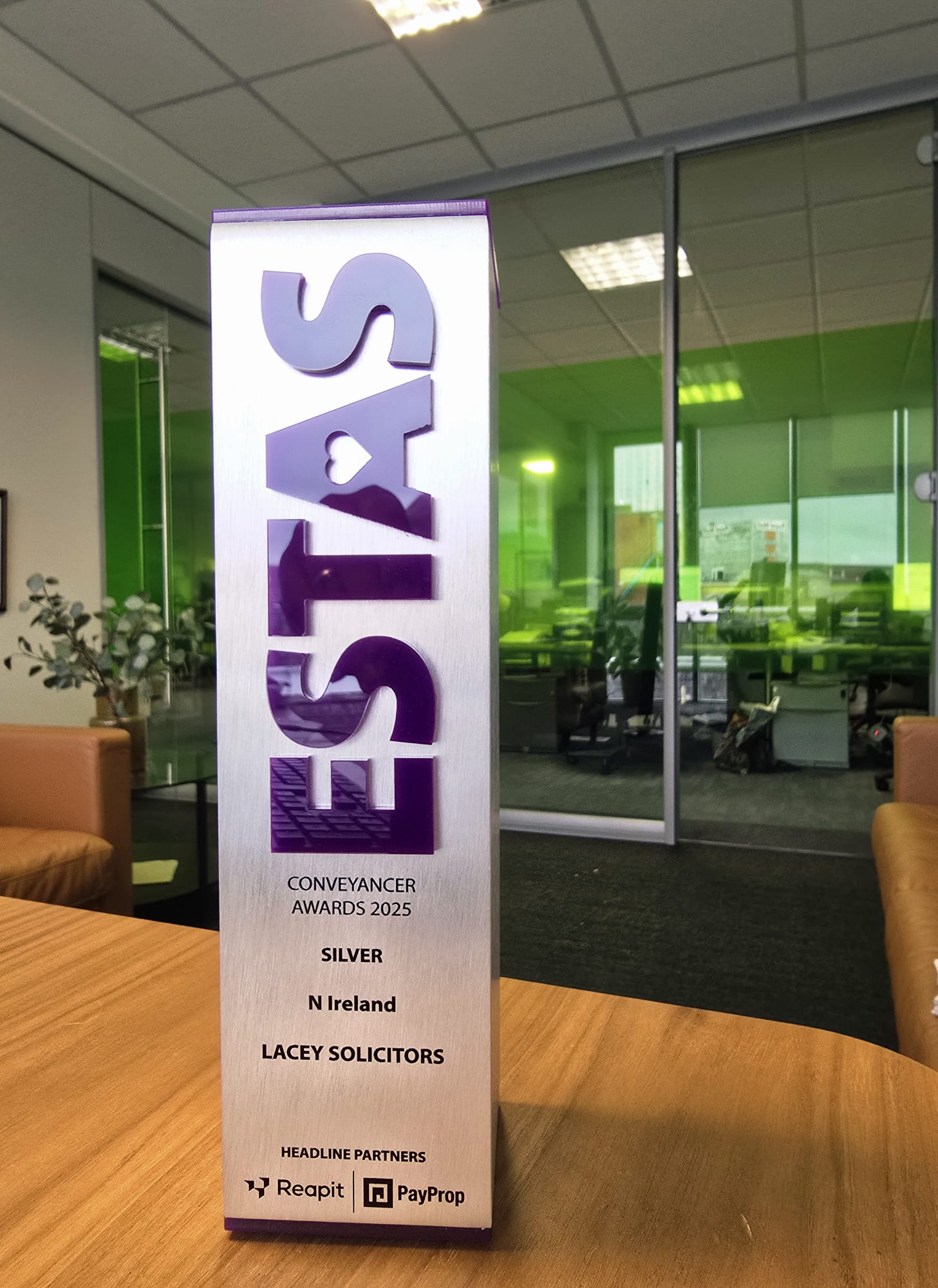Lacey Solicitors is proud to announce that our Property Department has again been recognised for client care in property law, by achieving Silver at the ESTAs NI Conveyancer Awards 2025. Lacey Solicitors was also a finalist at the 2025 Irish Law Awards as Property Law Firm of the Year. These accolades reflect our commitment to exceptional service and building trust with clients across Northern Ireland.
Expert Property Solicitors in Northern Ireland
Our Property Department officially opened in 2024, led by William Wilson, a seasoned conveyancing solicitor dedicated to modern, client-focused property services. Since its launch, the department has focused on:
- Being accessible and providing clear, practical advice throughout the property transaction process
- Ensuring efficient and timely completion of conveyancing matters
- Building long-term relationships with clients, estate agents, and mortgage advisors
- Delivering a transparent and client-focused service
Under William’s leadership, Lacey Solicitors has become a trusted name for residential and commercial conveyancing in Northern Ireland.
Why Choose Lacey Solicitors?
When it comes to property law, clients want solicitors they can trust. William Wilson, Head of our Property Department, explains the vision behind our approach:
“Starting a property department from scratch in Northern Ireland is a significant challenge, primarily due to stringent lender requirements and the existing frameworks of many property firms. A lot of firms are set in their ways, relying on traditional practices that can hinder innovation.
Rather than joining an established firm solely for its reputation, I saw an opportunity to develop a client-centred approach that emphasises communication, efficiency, and cost-effectiveness.
Lacey Solicitors already boasts a proven track record in client care, evidenced by their Lexcel accreditation. This recognition demonstrates their commitment to quality service, which aligns perfectly with my vision for the new property department. Additionally, their significant investment in legal technology positions us to streamline processes and enhance client interactions effectively.
By starting the property department here, we can leverage Lacey’s existing strengths while implementing a fresh perspective focused on the client experience. I believe this approach not only differentiates us from traditional property firms but also meets the evolving demands of clients in today’s market.”
ESTAS Award Recognition – A Testament to Client Care
The ESTAS Awards have been recognising service excellence in the property sector for over 21 years. Unlike other awards, ESTAS are based solely on verified client feedback, making them a true reflection of service quality.
Being awarded Silver in the 2025 NI Conveyancer Awards highlights Lacey Solicitors’ commitment to:
- Delivering service from the heart
- Building trust and long-term relationships with clients
- Providing a smooth, transparent, and stress-free conveyancing experience
This recognition shows clients and partners that Lacey Solicitors is a firm that not only talks about client service but consistently demonstrates it in practice.
Our Modern Approach to Conveyancing
At Lacey Solicitors, we combine decades of legal expertise with innovative technology to make property transactions faster, clearer, and more efficient. Our client-focused approach ensures:
- Real-time updates on the progress of your transaction in a way that suits you
- Reduced delays through streamlined document management and AI
- Clear cost structures from the outset with no hidden fees
- A dedicated team providing personalised guidance every step of the way
Whether you’re a first-time buyer, a property investor, or a commercial client, our team ensures that your property transaction is handled with precision, transparency, and care.
What Sets Our Property Department Apart
- Lexcel-accredited firm recognised for excellence in client care
- Award-winning team – Silver winners at the NI Conveyancer Awards 2025
- Finalists at the 2025 Irish Law Awards – Property Law Firm of the Year
- Innovative legal technology for efficient property transactions
- Transparent pricing and client-focused service
- Extensive knowledge of the Northern Ireland property market
By combining experience, technology, and a fresh perspective, Lacey Solicitors delivers conveyancing services that exceed expectations.
Contact Our Award-Winning Property Team
If you’re looking for trusted property solicitors in Northern Ireland or conveyancing solicitors in Belfast, Lacey Solicitors is here to help. Speak to William Wilson and our expert team today.
















